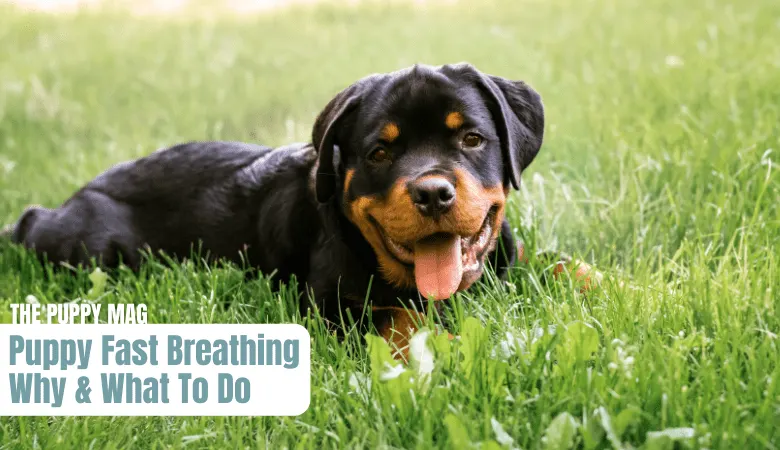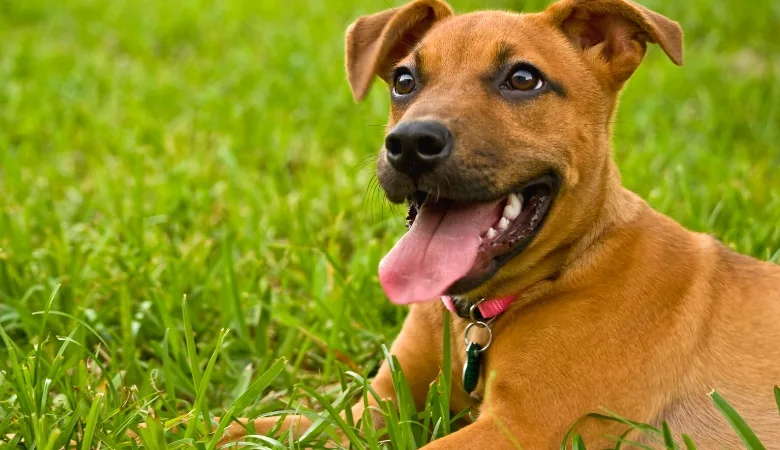If you observe your puppy breathing at a faster rate than usual, even during their sleep, it can understandably cause worry.
It is not always easy to know if your puppy’s breathing is too fast or if it is something that requires veterinary attention. This article explains everything you need to know.
Best answer: In most cases, it’s completely normal that puppies breathe much faster than adult dogs. Before puppies become efficient at regulating their body temperature, they will breathe quickly in order to do so.
Other reasons include exercise, excitement, or anxiety. More on this below.

Table of Contents
The 3 Main Reasons Why Puppies Breathe So Fast
Let’s run through the three main reasons why your little pup breathes heavily.
1. When excited or exercising
Just like you and me, puppies will naturally breathe more at certain times. This is called “behavioral” or “physiological” fast breathing and is nothing to worry about.
For example, to get more oxygen when playing or running about, your puppy will have to breathe faster. You may find that they also open their mouth to breathe: this is known as ‘panting’.
Short episodes of fast breathing like this are to be expected. Once the pup has caught their breath and settled down, their breathing should slow back to normal. Your puppy should be able to keep up with its peers when out and about.
2. During stressful events or high-anxiety situations
A puppy who is anxious or stressed will have high cortisol levels and will likely breathe faster than normal.
Their ‘fight or flight’ response has kicked in and their body is getting ready to do its thing.
Other signs we may see would include trembling, whining, and restless pacing. This type of behavior usually occurs during and after high-stress situations. Events like car journeys, going to the vet clinic, or the groomer are all classic examples of when dogs get overly anxious.
Puppies who are well socialized from a young age are less prone to anxiety. Anxiety can often be addressed with a combination of calming supplements, a training program, and the input of an experienced behaviorist.
3. During warm weather & regulating body temperature
Another common reason for a puppy’s respiratory rate to increase is when the weather is warmer.
While they sweat a little through their paws and ears, they mainly cool down by panting. Panting allows the warm air to travel outside and cooler air to be brought into the body.
There is also a cooling effect from the evaporation of the water in the mouth. If your puppy is too warm, move them to a cool spot and offer a drink of water.
TOP TIP: Puppies are less able to cope with heat than older dogs and are more prone to heatstroke, which can be life-threatening. Avoid them sunbathing in the mid-day sun and never leave them inside a locked car.
Popular article: Why is my puppy peeing so much all of a sudden
Why Does My Puppy Breathe So Fast When Sleeping?
This is a very common question. Many new owners worry that their pup has episodes of fast breathing when asleep. Surely sleeping is when a pup is resting and should be at their most relaxed? Well, this is not necessarily the case. In fact, your little pup can be quite busy while they’re dozing.
During REM sleep, your pup may dream. This can cause them to twitch their muscles, bark, move their paws and breathe quickly. Whether they are having a good dream or a nightmare, they may get a little over-excited. These short episodes of fast breathing are often seen in healthy puppies.
Importantly, you should be able to easily wake your pup from these episodes (no need to try more than once!) and their breathing should not be affected once they are awake.
What’s Considered Normal Breathing For a Puppy?
Sometimes, the best way to know what’s abnormal is to know what is in fact normal. In general, our puppy will breathe between 12 and 40 times a minute.
This varies depending on the age, breed, and size of the pup.
The easiest way to measure their respiratory rate is to count how many times their chest moves up and down in 30 seconds. This is then multiplied by two to give us the breathing rate per minute.
This should only be done when the puppy is resting or asleep, not when they are walking about, as any movement will elevate the respiratory rate. Similarly, there is no point in checking the rate when a dog is panting (as it will be high!).
Normal breath sounds should only be heard when very close to a dog and should sound like “a gentle breeze swishing through trees”. We should not hear any wheezing, whistling, grunting or crackling. Your puppy’s breathing should be relaxed and not labored or forced.
It is important to quickly mention brachycephalic breeds. These are breeds such as the Pug and Shih Tzu who have naturally short faces and snub noses.
These pups can have a harder time breathing as their airway size is reduced and they can have small nostrils and elongated soft palates.
These dogs may breathe more noisily, especially when exercising or warm. It is very important to have your brachycephalic dog checked by a vet to determine if their conformation (the shape of their face) is something that needs attention. In some cases, dogs may require surgery to help them breathe.
Important topic: Why is my puppy throwing up and what to do
Medical Issues That Can Cause a Puppy Breathe Fast

Sometimes, fast breathing will indicate an underlying medical issue. When this is the case, it is rare that fast breathing will be the only sign. We would usually also expect to see signs such as noisy breathing, lethargy, or poor weight gain.
- ‘Tachynpea’ is the medical term for breathing that is too fast while ‘Dyspnea’ is the medical term for labored or difficult breathing.
A medical issue that affects the cardiorespiratory system (heart, lungs, and airways) may affect breathing. For example, a puppy with congenital heart disease or aspiration pneumonia is likely to have some trouble breathing.
Other considerations for fast breathing would include a respiratory infection (which may be viral, bacterial, or parasitic), a source of pain, or fluid around the lungs.
A vet check is essential in order for us to be able to get to the bottom of things. The vet will check the puppy over, focusing on their heart and lungs. They may advise some diagnostic tests are performed, such as a blood test, stool analysis, and chest x-ray.
Required treatment will ultimately depend on what the underlying issue is and may include a course of antibiotics and anti-inflammatories. Your vet may also advise that you reduce exercise and use a body harness rather than a neck collar when walking. As your puppy recovers, you will be asked to monitor their breathing and to keep track of their resting respiratory rate. This is a good way of assessing improvement.
Popular article: Can puppies eat marrow bones? Bone FAQs
When To Be Concerned: Vet Advice
As an owner, it is important you trust your intuition. If you feel your puppy is ‘not quite right’, a check-up is always a sensible idea. Puppies can go downhill quickly and no vet will begrudge a check-up if you have any worries. There are certain signs that are ‘red flags’ and that are cause for concern including:
- Fast breathing that is not explained by stress, warmth or exercise
- Excessive panting
- Noisy breathing (snorts, wheeze or crackles)
- Additional respiratory signs such as sneezing, coughing or nasal discharge
- Lethargy
- Reduced ability or willingness to exercise
- Weight loss or failure to gain weight (try to weigh your puppy regularly to keep track of their growth)
- A bloated abdomen
- Blue or grey gums
As a rule of thumb, a puppy experiencing true tachypnea or dyspnea will be distressed and uncomfortable.
They may struggle to settle to sleep and will not be keen to play when awake. Labored breathing is always a true emergency and requires an immediate trip to the vet.
Worse affected dogs might need to be put in an oxygen chamber and to be given medicine to help them relax so they can breathe easier.
Trending article: Can puppies have Omega 3 fish oil supplements?
Last Thoughts
Mostly, it is normal for a puppy to breathe fast now and then. We can usually figure out why this is happening, and we will find that their breathing settles back to normal afterward. However, if a puppy is breathing fast at unexpected times or has other symptoms, they should be checked over by a vet.
There are many different things that can cause fast breathing in a puppy ranging from a nightmare during their sleep and warm weather to medical issues such as lungworm or pneumonia. As breathing issues can be very serious, it is important they are not overlooked.
Back to more Health and Behavior articles >>>
